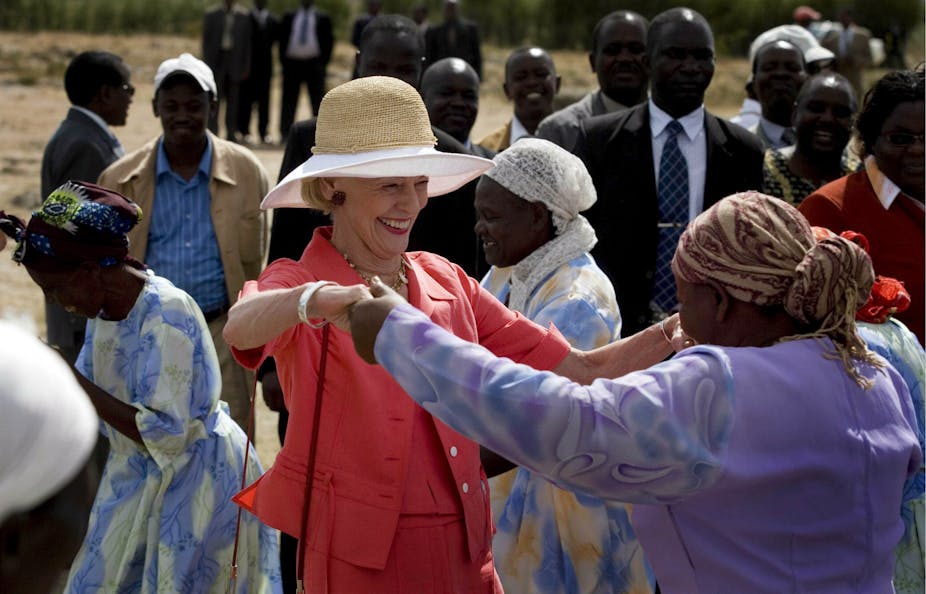For politicians subject to democratic accountability in today’s media-soaked world, two issues are particularly difficult to deal with. One is the future and the other is global development. More often than not they are put into the “too hard” basket and short-termism and parochialism are allowed to prevail.
The question of international aid is a good case study. It doesn’t necessarily win votes but it is very important to our future as a nation. We are called by our consciences to assist developing countries but it is also in our national interest as a trading nation to do so.
While it remains to be seen what the Abbott government’s decision to merge AusAID into the Department of Foreign Affairs and Trade will mean for Australia’s aid priorities and delivery, it is important to reflect on what the planned A$4.5 billion cut to foreign aid may mean for Australia.
Africa is a good case in point of Australia’s aid priorities. For many years Africa was out of sight and out of mind for Australian policymakers, but in recent years it has come back into play. Our aid effort has increased from $100 million in 2008 to $355 million in 2012-13. In 2012, we provided 1,000 training opportunities to 50 countries through our Australia Awards scheme.
We focus our efforts in areas of Australian strength such as agriculture, natural resource development, public health and governance. In and of itself this helps our own educators and researchers in these areas both directly and for the leverage it creates with other donors and investors in Africa.
Grinding and unrelenting poverty is the daily experience for many in Africa, despite a wealth of natural and human resources. Most still live and work on the land where infrastructure is poor and the climate can be devastating. The oppression of women is commonplace, and civil war and political conflict fuelled by race and ethnicity - coupled with bad and corrupt government - have left a terrible legacy from which it is hard to escape.
There may have been economic growth in recent years, but Africa is still a case study in unfulfilled potential. That, of course, is “the point” of our aid efforts. An Africa that can develop sustainably not only releases people from poverty but creates opportunities for trade and commerce. For example, even the smallest surpluses from agriculture creates the potential for commerce.
Australia too is a resource-rich country, but this is because of its relatively small population and small market needs that allow international trade and investment to prosper. We are a trading nation and as such need to be “in the world” in every sense of those words.
It also means that opportunities are created for us when others prosper. We have seen this happen in a dramatic way with the recovery of Japan after World War Two and with China when it opened up after 1978. That we changed our attitudes and devoted resources to building our relationships with Japan from the late 1950s and China from the early 1970s produced good results for all of us.
In a smaller way, we are seeing this happen in Africa today. Over the last decade Africa’s GDP has more than tripled and Australia’s trade with the continent has grown by about 6% annually. More than 200 resource companies from Australia are involved in 650 projects in 42 countries. Many of our agriculture, education and water management companies are also involved.
Underpinning much of this investment and trade has been an increased understanding of Africa’s potential in business circles but also an improvement in our political effort, with Australia now having diplomatic relations with all 54 African countries. However, Australia’s aid program has also been part of the equation. It creates connections and builds trust. It is assisting with the development of infrastructure and better practices in a wide range of areas.
Our alumni are encouraged to be leaders in their professions and often continue links to Australia through research partnerships and particular projects. Indeed, we often see these partnerships being used to lever wider interest from the international community.
Most importantly, too, AusAID promotes gender equality and better government in all that it does, with 49% of all Australia Award recipients from Africa today being women.
At a recent conference of Australia Award alumni from all over Africa held in Cape Town (which I attended as the Chair of the Australia Awards Board), I was able to gain an appreciation of the breadth and depth of the Australian aid program and the further initiatives it generates.
It might be research on the post-harvest management of crops, the better use of existing sources of food and nutrition, the development of youth-friendly health services in a continent ravaged by HIV-AIDS, the application of up-to-date practices in geo-scientific survey, the better management of revenue flaws from mining or the wider engagement of the population - particularly the marginalised - in decision-making.
Australia does have its weaknesses as a nation - some acknowledged, and some not so. However, we also have strengths and a knowledge base that we can - and should - share with the developing nations. Not only do we gain from the production and export of a range of goods and services in the global marketplace, we also gain from the export of good will and the commitment to help.
Populism and the parochialism it generates holds us back, but a generous and well-targeted aid effort - when consistently applied - takes us forward.

